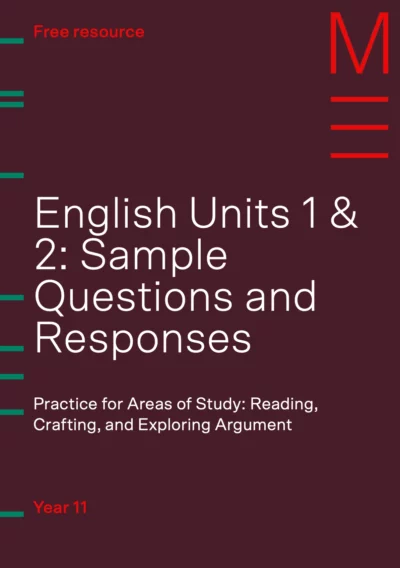Welcome to Matrix Education
To ensure we are showing you the most relevant content, please select your location below.
Select a year to see courses
Learn online or on-campus during the term or school holidays
Learn online or on-campus during the term or school holidays
Learn online or on-campus during the term or school holidays
Learn online or on-campus during the term or school holidays
Learn online or on-campus during the term or school holidays
Learn online or on-campus during the term or school holidays
Learn online or on-campus during the term or school holidays
Get HSC exam ready in just a week
Select a year to see available courses
Science guides to help you get ahead
Science guides to help you get ahead
Kick off Year 11 with confidence using this clear and practical guide to VCE English Units 1 & 2—build your skills and get ahead early.

Join 75,893 students who already have a head start.
"*" indicates required fields
Related courses

test
In Part 1 of our VCE English Units 1 & 2 Guide, we explored the key skills in Unit 1. Now in Part 2, we’re focusing on Unit 2 of VCE English Units 1 & 2, diving into deeper text analysis and persuasive writing in Year 11 English.
We’ll cover:
Let’s get into it.

Get sample questions and answers for Units 1 & 2: Reading Texts, Crafting Texts, and Exploring Argument.

Fill out your details below to get this resource emailed to you.
"*" indicates required fields
Key Skill | Explanation |
| Develop strategies for inferential reading and viewing |
|
| Read and engage with a text for meaning |
|
| Discuss and analyse ideas, concerns and tensions presented in a text |
|
| Discuss and analyse the specific vocabulary, text structures and language features in text, including the use of appropriate metalanguage, and how these aspects create meaning |
|
| Respond to a set topic |
|
| Construct analytical writing in response to a text, including the use of appropriate evidence from the text |
|
| Use appropriate strategies to review and edit the writing |
|
| Listen attentively and respond appropriately to others’ views during discussion |
|
| Use the conventions of syntax, punctuation and spelling of Standard Australian English. |
|

Key Skill | Explanation |
| Summarise the key points in arguments using skills such as note-taking and annotation |
|
Identify, explore and apply:
|
|
| Apply the conventions of discussion and debate |
|
| Use appropriate evidence to support analytical writing |
|
| Extend individual capacity to use language confidently |
|
| Acquire and apply relevant metalanguage |
|
| Develop an analysis of persuasive texts |
|
| Draft, review, edit and refine analytical writing using feedback gained from individual reflection, and peer and teacher feedback |
|
| Develop sound and sequential argument, including appropriate use of evidence and language |
|
| Plan, draft and refine a point of view text for oral presentation |
|
| Apply the conventions of syntax, punctuation and spelling of Standard Australian English. |
|

Download our free sample questions and exemplar responses for VCE English Units 1 & 2 and get confident with your assessments!
Get sample questions and answers for Units 1 & 2: Reading Texts, Crafting Texts, and Exploring Argument. Fill out your details below to get this resource emailed to you. "*" indicates required fields
Ace every Area of Study in VCE English

Ace every Area of Study in VCE English
Written by Matrix Education
Matrix is Sydney's No.1 High School Tuition provider. Come read our blog regularly for study hacks, subject breakdowns, and all the other academic insights you need.© Matrix Education and www.matrix.edu.au, 2023. Unauthorised use and/or duplication of this material without express and written permission from this site’s author and/or owner is strictly prohibited. Excerpts and links may be used, provided that full and clear credit is given to Matrix Education and www.matrix.edu.au with appropriate and specific direction to the original content.